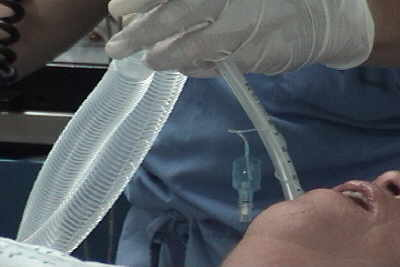What is extubation?
What is done?
Once your loved one is ready to be taken off the ventilator(Ventilators (Breathing Machines) after your loved one has gone through a ‘weaning’ process. Weaning means gradually reducing the support the ventilator is providing to your loved one, until minimal parameters have been reached so that your loved one can breath by him or herself. The weaning period can be relatively quick, within few hours after admission to Intensive Care or it can be very slow, sometimes over many days, depending on circumstances. Before extubation your loved one has been deemed ready for extubation by the doctor and the nurse. Other factors that need to be present before your loved one can be extubated are
- awake and cooperative
- adequate oxygenation
- adequate ABG(Arterial Blood Gas)
- sitting up in bed
- presence of spontaneous cough

Prior to taking the Breathing Tube or Endotracheal Tube out the bedside nurse will explain the extubation procedure to your loved one. Usually what happens is that before the tube is removed, the nurse will suction down the breathing tube, in order to clear any sputum or secretions that may stop your loved one from breathing after extubation. Then another suction is required, this time in your loved ones mouth in order to clear any secretions there. Lastly the Breathing tube’s cuff(air balloon) in your loved ones trachea(wind pipe) is taken down and the tube is removed. During extubation your loved one may feel and look uncomfortable and he or she will cough while the tube is taken out. The whole procedure is quick and only takes a couple of minutes. After extubation an oxygen mask will be applied to assist your loved one breathing spontaneously. Your loved one remains closely monitored(Bedside Monitors) in order to manage a successful process after extubation. In some circumstances after extubation, application of an oxygen mask may not be sufficient and BIPAP or Non- Invasive Ventilation(NIV) may have to be commenced.
Your loved one may have difficulties talking at first and he or she may have a hoarse voice after extubation.
Also, sometimes your critically ill loved one may not have “woken up” fully to be ready for extubation and that may cause a delay. Check out this article/video here if your critically ill loved one hasn’t “woken up”.
In some cases and after it has been confirmed that a Patient is approaching their end of Life the tube will be removed. Once the tube has been removed, the Patient may die quickly within minutes, but sometimes this may take hours to days. This will only be done after discussion with the Family and after views have been discussed of what is in the best interest of your loved one. This is done to enhance your loved ones dignity during this difficult time.
If the Patient dies and there will be a coroner’s case the breathing tube must remain in.

What are the risks?
It is uncommon to have problem after extubation, however some Patients have difficulty breathing once extubated. If your loved one has difficulties after being extubated, it usually comes down to a number of reasons such as
- airway swelling
- breathing muscle weakness
- lung infection
Usually treatment of choice are
- nebulising medication to mobilise secretions and sputum
- physiotherapy and suctioning
- BIPAP or Non- Invasive Ventilation(NIV
- A small number of Patients however will need to be re-intubated (re-insertion of a Breathing Tube or Endotracheal Tube) and placed back on the ventilator (Ventilators (Breathing Machines)
Any Questions?
Of course, if you have any questions or concerns, please discuss them with the ICU nurses and doctors.
All Intensive Care procedures carry a degree of risk even when performed by skilled and experienced staff. Please discuss these issues with the medical and nursing staff who are caring for your loved one and of course, if you have any questions or concerns, please ask the ICU nurses and doctors.
The information contained on this page is general in nature and therefore cannot reflect individual Patient variation. It is meant as a back up to specific information which will be discussed with you by the Doctors and Nurses caring for your loved one. INTENSIVE CARE HOTLINE attests to the accuracy of the information contained here BUT takes no responsibility for how it may apply to an individual Patient. Please refer to the full disclaimer.
How can you have PEACE OF MIND, control, power and influence whilst your loved one is critically ill in Intensive Care?
You get to that all important feeling of PEACE OF MIND, CONTROL, POWER AND INFLUENCE when you download your FREE “INSTANT IMPACT” report NOW by entering your email below! In Your FREE “INSTANT IMPACT” report you’ll learn quickly how to get PEACE OF MIND, real power and real control and how you can influence decision making fast, whilst your loved one is critically ill in Intensive Care! Your FREE “INSTANT IMPACT” Report gives you in-depth insight that you must know whilst your loved one is critically ill or is even dying in Intensive Care! Sign up and download your FREE “INSTANT IMPACT” REPORT now by entering your email below!
In your FREE “INSTANT IMPACT” REPORT you’ll learn how to speak the “secret” Intensive Care language so that the doctors and the nurses know straight away that you are an insider and that you know and understand what’s really happening in Intensive Care!
In your FREE reports you’ll also discover
- How to ask the doctors and the nurses the right questions
- Discover the many competing interests in Intensive Care and how your critically ill loved one’s treatment may depend on those competing interests
- How to eliminate fear, frustration, stress, struggle and vulnerability even if your loved one is dying
- 5 “killer” tips& strategies helping you to get on the right path to PEACE OF MIND, control, power and influence in your situation
- You’ll get real world examples that you can easily adapt to your and your critically ill loved one’s situation
- How to stop being intimidated by the Intensive Care team and how you will be seen as equals
- You’ll get crucial ‘BEHIND THE SCENES’ insight so that you know and understand what is really happening in Intensive Care
- How you need to manage doctors and nurses in Intensive Care(it’s not what you think)
Make sure you also check out our “blog” section for tips& strategies and also check out our “your questions answered” section where we answer your questions or send me an email to [email protected] with your questions!
Sincerely, your Friend
Patrik Hutzel
Related articles:
-
- How long is a Patient kept on a BIPAP machine in Intensive Care?
- What is an induced coma and why is my critically ill loved one in an induced coma?
- How long can a breathing tube or an endotracheal tube can stay in?
- What is an induced coma and why is my critically ill loved one in an induced coma?
- The 3 most dangerous mistakes that you are making but you are unaware of, if your loved one is a critically ill Patient in Intensive Care
- How to always achieve your goals whilst your loved one is critically ill in Intensive Care
- Why you must make up your own mind about your critically ill loved one’s situation in Intensive Care even if you’re not a doctor or a nurse!
- Follow this proven 5 step process on how to be in control and influential if your loved one is a long-term Patient in Intensive Care
- How to quickly take control and have real power and influence if your loved one is critically ill in Intensive Care
- Why does my loved one need a Tracheostomy in Intensive Care?
- Tracheostomy and weaning off the ventilator in Intensive Care, how long can it take?
- My sister has been in ICU for 21 weeks with Tracheostomy and still ventilated. What do we need to do?
- Severe lung failure and my aunty is not expected to survive…
- 3 quick steps on how to position and prepare yourself well mentally, whilst your loved one is critically ill in Intensive Care
- How to get what you want whilst your loved one is critically ill in Intensive Care
- 5 steps to become a better negotiator if your loved one is critically ill in Intensive Care
- 5 Ways to have control, power and influence while your loved one is critically ill in Intensive Care
- Be more selfish if your loved one is critically ill in Intensive Care
- How to stay positive if your loved one is critically ill in Intensive Care
- 4 ways on how to be more persuasive if your loved one is critically ill in Intensive Care
- How to make sure that your values and beliefs are known whilst your loved one is critically ill in Intensive Care
- How to make sure that “what you see is always what you get” whilst your loved one is critically ill in Intensive Care
- What the doctors and the nurses behaviour in Intensive Care is telling you about the culture in a unit
- How long does it take to wake up from a Traumatic brain injury or severe head injury
- How to take control if your loved one has a severe brain injury and is critically ill in Intensive Care
- Family Meetings in Intensive Care or the Elephant in the Room
- What you need to do if your loved one is dying in Intensive Care(part one)
- What you need to do if your loved one is dying in Intensive Care(part two)
- Intensive Care at its best?
- How INTENSIVECAREHOTLINE.COM Can Help You
- What you and your Family need to do if your critically ill loved one is very sick in Intensive Care and faces an uncertain future
- How long can somebody stay in Intensive Care?
- My Family can’t agree on what’s best for my sister in Intensive Care…Help!
- My husband is dying in Intensive Care, but we need more time…
- My mother sustained serious brain damage after a stroke and she now is in multi- organ failure


